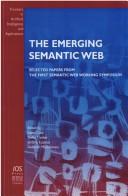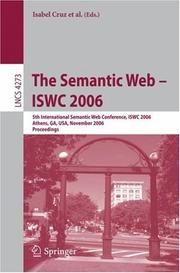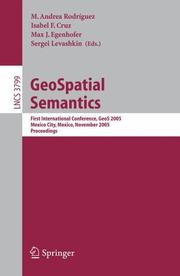| Listing 1 - 10 of 27 | << page >> |
Sort by
|

ISBN: 1601294646 600000575X 9786610505500 1280505508 0585458898 9780585458892 1586032550 9781586032555 4274905136 9784274905131 9781601294647 6610505500 9781280505508 Year: 2002 Publisher: Amsterdam Washington, DC Tokyo IOS Ohmsha
Abstract | Keywords | Export | Availability | Bookmark
 Loading...
Loading...Choose an application
- Reference Manager
- EndNote
- RefWorks (Direct export to RefWorks)
The Semantic Web is a Web defined and linked in a way that it can be used by machines not just for display purposes, but also for automation, integration and reuse of data across various applications. In order for computers to provide more help to people, the Semantic Web augments the current Web with formalized knowledge and data that can be processed by computers. It thus needs a language for expressing knowledge. This knowledge is used to describe the content of information sources, through ontologies, and the condition of operation of Web services. This work presents the state-of-the-art i
Book
Year: 1977 Publisher: Santiago de Chile Museo Nacional de Bellas Artes
Abstract | Keywords | Export | Availability | Bookmark
 Loading...
Loading...Choose an application
- Reference Manager
- EndNote
- RefWorks (Direct export to RefWorks)
Painting --- paintings [visual works] --- artist painters --- Chile

ISBN: 9783540490296 3540490299 3540490558 Year: 2006 Publisher: Berlin ; New York : Springer,
Abstract | Keywords | Export | Availability | Bookmark
 Loading...
Loading...Choose an application
- Reference Manager
- EndNote
- RefWorks (Direct export to RefWorks)
“Evolve or perish” – this is the motto for living systems. Judging by this saying, the Web is alive and well: new sites and business ideas are coming online almost daily and are able to attract millions of users often. The more recently coined term “Web 2.0” summarizes many of the new developments, capturing efforts making the Web more interactive (like Ajax), more collaborative (like Wikis), or more relationship oriented (like online social networks), aiming to partially fulfill the original promise of the Web. These new Web developments offer an opportunity and challenge for the Semantic Web: what previously manifested itself mostly in “dry” specifications is now becoming the foundation for information exchange on the Web, creating a shared semantic information space. These and other challenges have been picked up by several hundred computer scientists, developers, vendors, government workers, venture capitalists, students, and users, gathered in Athens, Atlanta, USA, November 5–9, 2006, for the Fifth International Semantic Web Conference (ISWC 2006). Building on previous successful meetings in Sardinia, Sanibel Island, Hiroshima, and Galway, this sixth annual conference demonstrates new research results, technology, and applications that show current incarnations of the Semantic Web. Especially encouraging is the shift towards more applications—whereas the Research Track attracted roughly as many papers as in the previous year, the contributions submitted to the In-Use Track doubled.
Semantic Web --- Web site development --- Knowledge management --- Ontology --- Web sémantique --- Sites Web --- Gestion des connaissances --- Ontologie --- Congresses. --- Congrès --- Développement --- Computer Science --- Telecommunications --- Electrical & Computer Engineering --- Engineering & Applied Sciences --- Computer science. --- Computer communication systems. --- Information storage and retrieval. --- Multimedia information systems. --- Computer Science. --- Information Systems Applications (incl. Internet). --- Computer Science, general. --- Popular Computer Science. --- Information Storage and Retrieval. --- Computer Communication Networks. --- Multimedia Information Systems. --- Computer-based multimedia information systems --- Multimedia computing --- Multimedia information systems --- Multimedia knowledge systems --- Information storage and retrieval systems --- Communication systems, Computer --- Computer communication systems --- Data networks, Computer --- ECNs (Electronic communication networks) --- Electronic communication networks --- Networks, Computer --- Teleprocessing networks --- Data transmission systems --- Digital communications --- Electronic systems --- Information networks --- Telecommunication --- Cyberinfrastructure --- Electronic data processing --- Network computers --- Informatics --- Science --- Distributed processing --- Information storage and retrieva. --- Multimedia systems. --- Information storage and retrieval systems. --- Automatic data storage --- Automatic information retrieval --- Automation in documentation --- Computer-based information systems --- Data processing systems --- Data storage and retrieval systems --- Discovery systems, Information --- Information discovery systems --- Information processing systems --- Information retrieval systems --- Machine data storage and retrieval --- Mechanized information storage and retrieval systems --- Computer systems --- Electronic information resources --- Data libraries --- Digital libraries --- Information organization --- Information retrieval --- Application software. --- Application computer programs --- Application computer software --- Applications software --- Apps (Computer software) --- Computer software
Book
ISBN: 1581131186 1581131615 Year: 1999 Publisher: New York, N.Y. ACM
Abstract | Keywords | Export | Availability | Bookmark
 Loading...
Loading...Choose an application
- Reference Manager
- EndNote
- RefWorks (Direct export to RefWorks)
Book
ISBN: 3658213469 3658213450 Year: 2018 Publisher: Wiesbaden : Springer Fachmedien Wiesbaden : Imprint: Springer VS,
Abstract | Keywords | Export | Availability | Bookmark
 Loading...
Loading...Choose an application
- Reference Manager
- EndNote
- RefWorks (Direct export to RefWorks)
This book provides critical perspectives on contemporary collaborative consumption, a recent societal phenomenon shaking up previously fixed socio-economic categories such as the producer and the consumer. The contributors discuss the role of trust and reciprocity in collaborative consumption through seven case studies. The chapters advance debates on the contradictions of positioning collaborative consumption as possible solutions for a more sustainable development and exacerbating new forms of inequalities and injustice. The book contributes a nuanced appraisal of social and economic activity for reflecting socio-technological changes in contemporary societies. Content Reciprocity in the sharing economy: the case for time banking platforms • Collective representation on collaborative economy platforms • “Foodsharing”: Reflecting on individualized collective action in a collaborative consumption community organization • Riding free-riders? A study of the phenomenon of BlaBlaCar in Italy • The sharing economy and young people: an exploratory research project • Collaborative consumption and trust-building processes in the emerging new food economy • Shared use and owning of clothes: borrow, steal or inherit The Editors Isabel Cruz, Institute of Sociology at the Faculty of Letters at the University of Porto. Rafaela Ganga, Research Associate at the Institute of Cultural Capital (ICC) at the University of Liverpool and Liverpool John Moores University. Stefan Wahlen, Assistant Professor for "Consumption Governance" at the Sociology of Consumption and Households group at Wageningen University. .
Social sciences. --- Sustainable development. --- Economic sociology. --- Sociology --- Social Sciences. --- Research Methodology. --- Consumer Behavior. --- Organizational Studies, Economic Sociology. --- Sustainable Development. --- Sociological research --- Economic sociology --- Economics --- Socio-economics --- Socioeconomics --- Sociology of economics --- Development, Sustainable --- Ecologically sustainable development --- Economic development, Sustainable --- Economic sustainability --- ESD (Ecologically sustainable development) --- Smart growth --- Sustainable development --- Sustainable economic development --- Economic development --- Behavioral sciences --- Human sciences --- Sciences, Social --- Social science --- Social studies --- Civilization --- Research. --- Social aspects --- Environmental aspects --- Consumption (Economics) --- Econometric models. --- Sociology-Research. --- Motivation research (Marketing). --- Advertising --- Marketing research --- Motivation (Psychology) --- Research --- Psychological aspects --- Sociology—Research.
Book
ISBN: 1581132824 1581132832 Year: 2000 Publisher: New York, N.Y. ACM
Abstract | Keywords | Export | Availability | Bookmark
 Loading...
Loading...Choose an application
- Reference Manager
- EndNote
- RefWorks (Direct export to RefWorks)
Digital
ISBN: 9783658213466 Year: 2018 Publisher: Wiesbaden Springer Fachmedien Wiesbaden, Imprint: Springer VS
Abstract | Keywords | Export | Availability | Bookmark
 Loading...
Loading...Choose an application
- Reference Manager
- EndNote
- RefWorks (Direct export to RefWorks)
This book provides critical perspectives on contemporary collaborative consumption, a recent societal phenomenon shaking up previously fixed socio-economic categories such as the producer and the consumer. The contributors discuss the role of trust and reciprocity in collaborative consumption through seven case studies. The chapters advance debates on the contradictions of positioning collaborative consumption as possible solutions for a more sustainable development and exacerbating new forms of inequalities and injustice. The book contributes a nuanced appraisal of social and economic activity for reflecting socio-technological changes in contemporary societies. Content Reciprocity in the sharing economy: the case for time banking platforms • Collective representation on collaborative economy platforms • “Foodsharing”: Reflecting on individualized collective action in a collaborative consumption community organization • Riding free-riders? A study of the phenomenon of BlaBlaCar in Italy • The sharing economy and young people: an exploratory research project • Collaborative consumption and trust-building processes in the emerging new food economy • Shared use and owning of clothes: borrow, steal or inherit The Editors Isabel Cruz, Institute of Sociology at the Faculty of Letters at the University of Porto. Rafaela Ganga, Research Associate at the Institute of Cultural Capital (ICC) at the University of Liverpool and Liverpool John Moores University. Stefan Wahlen, Assistant Professor for "Consumption Governance" at the Sociology of Consumption and Households group at Wageningen University. .
Science --- Sociology --- Economics --- Production management --- Consumer behavior --- Market research --- sociologie --- economie --- onderzoeksmethoden --- consumentengedrag --- consumptie --- duurzame ontwikkeling --- marktonderzoek
Book
ISBN: 3642350623 3642350631 Year: 2012 Publisher: Berlin, Heidelberg : Springer Berlin Heidelberg : Imprint: Springer,
Abstract | Keywords | Export | Availability | Bookmark
 Loading...
Loading...Choose an application
- Reference Manager
- EndNote
- RefWorks (Direct export to RefWorks)
This book constitutes the proceedings of the 13th International Conference on Web Information Systems Engineering, WISE 2012, held in Paphos, Cyprus, in November 2012. The 44 full papers, 13 short papers, 9 demonstrations papers and 9 “challenge” papers were carefully reviewed and selected from 194 submissions. The papers cover various topics in the field of Web Information Systems Engineering.
Engineering & Applied Sciences --- Computer Science --- Computer science. --- Software engineering. --- Computers. --- Data mining. --- Information storage and retrieval. --- User interfaces (Computer systems). --- Computer Science. --- Information Systems Applications (incl. Internet). --- Information Systems and Communication Service. --- Information Storage and Retrieval. --- User Interfaces and Human Computer Interaction. --- Software Engineering. --- Data Mining and Knowledge Discovery. --- Interfaces, User (Computer systems) --- Human-machine systems --- Human-computer interaction --- Algorithmic knowledge discovery --- Factual data analysis --- KDD (Information retrieval) --- Knowledge discovery in data --- Knowledge discovery in databases --- Mining, Data --- Database searching --- Automatic computers --- Automatic data processors --- Computer hardware --- Computing machines (Computers) --- Electronic brains --- Electronic calculating-machines --- Electronic computers --- Hardware, Computer --- Computer systems --- Cybernetics --- Machine theory --- Calculators --- Cyberspace --- Computer software engineering --- Engineering --- Informatics --- Science --- Information systems. --- Information storage and retrieva. --- Information storage and retrieval systems. --- Automatic data storage --- Automatic information retrieval --- Automation in documentation --- Computer-based information systems --- Data processing systems --- Data storage and retrieval systems --- Discovery systems, Information --- Information discovery systems --- Information processing systems --- Information retrieval systems --- Machine data storage and retrieval --- Mechanized information storage and retrieval systems --- Electronic information resources --- Data libraries --- Digital libraries --- Information organization --- Information retrieval --- Application software. --- Application computer programs --- Application computer software --- Applications software --- Apps (Computer software) --- Computer software

ISBN: 3540302883 9783540302889 Year: 2005 Publisher: Berlin : Springer,
Abstract | Keywords | Export | Availability | Bookmark
 Loading...
Loading...Choose an application
- Reference Manager
- EndNote
- RefWorks (Direct export to RefWorks)
Geographic information systems --- Geographical perception --- Space perception
Book
ISBN: 1581139799 Year: 2004 Publisher: ACM
Abstract | Keywords | Export | Availability | Bookmark
 Loading...
Loading...Choose an application
- Reference Manager
- EndNote
- RefWorks (Direct export to RefWorks)
| Listing 1 - 10 of 27 | << page >> |
Sort by
|

 Search
Search Feedback
Feedback About UniCat
About UniCat  Help
Help News
News